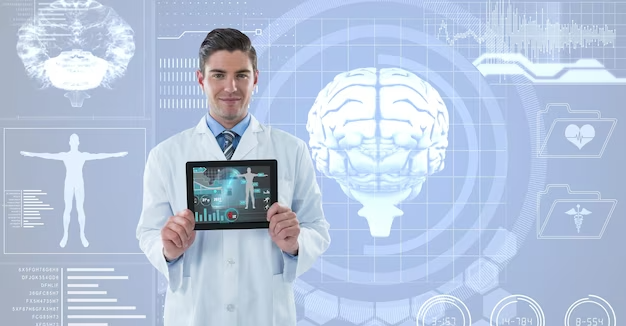In recent years, the intersection of artificial intelligence (AI) and mental health has garnered significant attention. The marriage of advanced technologies with the complexities of the human mind has paved the way for innovative approaches in the diagnosis and treatment of mental health disorders. This article explores the pivotal role that AI plays in reshaping mental health care, providing a nuanced understanding of its applications and implications.
Understanding the Landscape of Mental Health Diagnosis
1.1 Traditional Challenges in Diagnosis
Historically, mental health diagnosis has been fraught with challenges, ranging from subjectivity in assessments to the limited availability of mental health professionals. AI emerges as a transformative force, addressing these longstanding issues through its ability to analyze vast datasets and identify patterns that may elude human observation.
1.2 AI-Powered Diagnostic Tools
Artificial intelligence algorithms, fueled by machine learning capabilities, exhibit remarkable prowess in sifting through diverse sets of patient data. From speech patterns to facial expressions, these tools can discern subtle cues that might indicate the presence of mental health disorders. This nuanced analysis allows for early detection and more accurate diagnoses by mental health billing companies.
Revolutionizing Treatment Approaches
2.1 Personalized Treatment Plans
AI is ushering in an era of personalized mental health care. By analyzing individual patient data, including genetic makeup, lifestyle, and treatment responses, AI algorithms can tailor treatment plans to suit the unique needs of each patient. This marks a departure from traditional one-size-fits-all approaches, potentially enhancing treatment efficacy.
2.2 Therapeutic Chatbots and Virtual Companions
In the realm of treatment, AI-driven therapeutic chatbots and virtual companions have emerged as powerful tools. These digital entities provide continuous support and engagement, helping individuals manage their mental health on a day-to-day basis. From mood tracking to providing coping strategies, these virtual entities offer a supplementary layer of care.
Ethical Considerations in AI and Mental Health
3.1 Data Privacy and Security
As AI delves into the intricacies of mental health, the ethical implications cannot be ignored. Ensuring the privacy and security of sensitive patient data is paramount. Striking a balance between harnessing the potential of AI and safeguarding individual privacy requires robust regulatory frameworks and ethical guidelines.
3.2 Bias in AI Algorithms
The development of AI algorithms for mental health diagnosis demands meticulous attention to bias mitigation. If not carefully calibrated, these algorithms can perpetuate existing disparities in healthcare. Addressing biases ensures that AI contributes to equitable and just mental health outcomes.
Integration Challenges and Future Outlook
4.1 Integration Challenges
Despite the promising advancements, the seamless integration of AI into mental health care faces challenges. Resistance to technological adoption, concerns about job displacement for mental health professionals, and the need for standardized protocols are among the hurdles that must be navigated for widespread implementation.
4.2 The Role of Mental Health Billing Companies
In the evolving landscape of mental health care, the role of mental health billing companies becomes crucial. As AI transforms diagnostic and treatment processes, billing companies play a vital role in streamlining financial aspects, ensuring the efficient flow of resources, and facilitating the economic sustainability of mental health services.
FAQS
Q1: How does artificial intelligence contribute to the improvement of mental health diagnosis?
Artificial intelligence (AI) enhances mental health diagnosis by leveraging machine learning to analyze vast datasets. It can identify subtle patterns in various data types, such as speech patterns and facial expressions, leading to more accurate and early detection of mental health disorders.
Q2: What are the key challenges in traditional mental health diagnosis that AI aims to address?
Traditional mental health diagnosis faces challenges like subjectivity in assessments and a shortage of mental health professionals. AI mitigates these challenges by providing objective and data-driven insights, thus revolutionizing the diagnostic process.
Q3: How does AI personalize treatment plans for individuals with mental health disorders?
AI tailors treatment plans by analyzing individual patient data, including genetic makeup, lifestyle, and treatment responses. This personalized approach ensures that treatments are customized to meet the unique needs of each patient, moving away from generic and one-size-fits-all approaches.
Q4: What ethical considerations surround the integration of AI in mental health care?
The integration of AI in mental health care raises concerns about data privacy and security. Striking a balance between harnessing the potential of AI and safeguarding individual privacy requires the establishment of robust regulatory frameworks and ethical guidelines. Additionally, mitigating bias in AI algorithms is crucial to ensure fair and equitable outcomes.
Q5: What role do mental health billing companies play in the context of AI-driven mental health care?
As AI transforms diagnostic and treatment processes in mental health, mental health billing companies play a vital role in managing financial aspects. They contribute to the efficient flow of resources, ensuring economic sustainability for mental health services. This collaboration is essential for the seamless functioning of the evolving mental health care landscape.
Conclusion
In conclusion, the synergy between artificial intelligence and mental health presents a paradigm shift in the diagnosis and treatment of mental health disorders. From personalized treatment plans to the ethical considerations surrounding AI implementation, this intersection offers both unprecedented opportunities and challenges. As mental health care continues to evolve, the careful integration of AI, along with the support of entities like mental health billing companies, is imperative for creating a holistic and effective approach to mental well-being.

